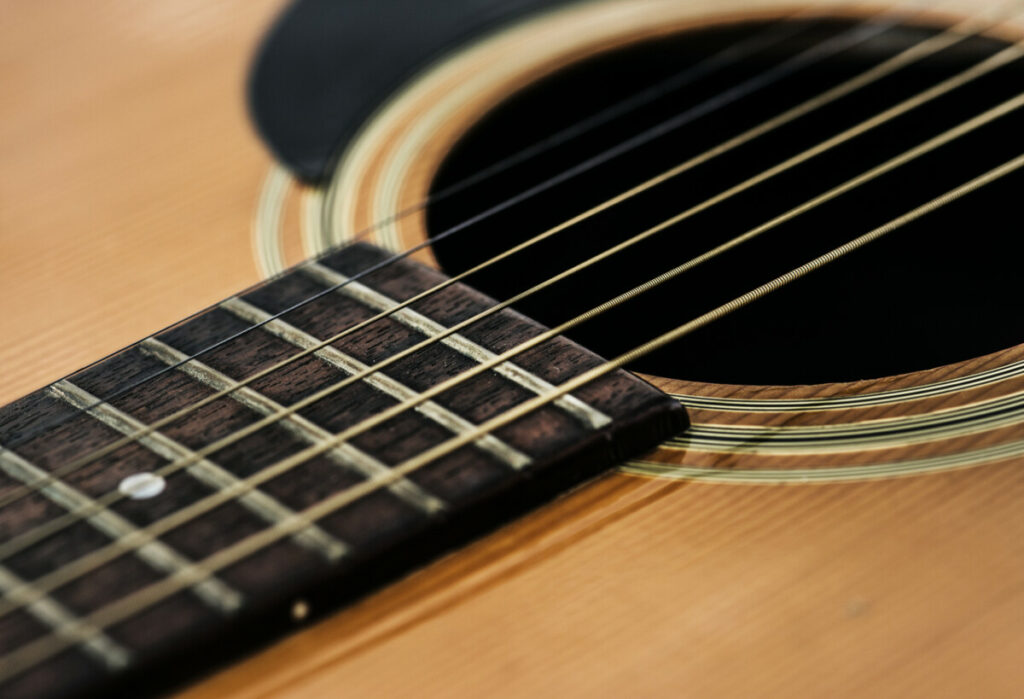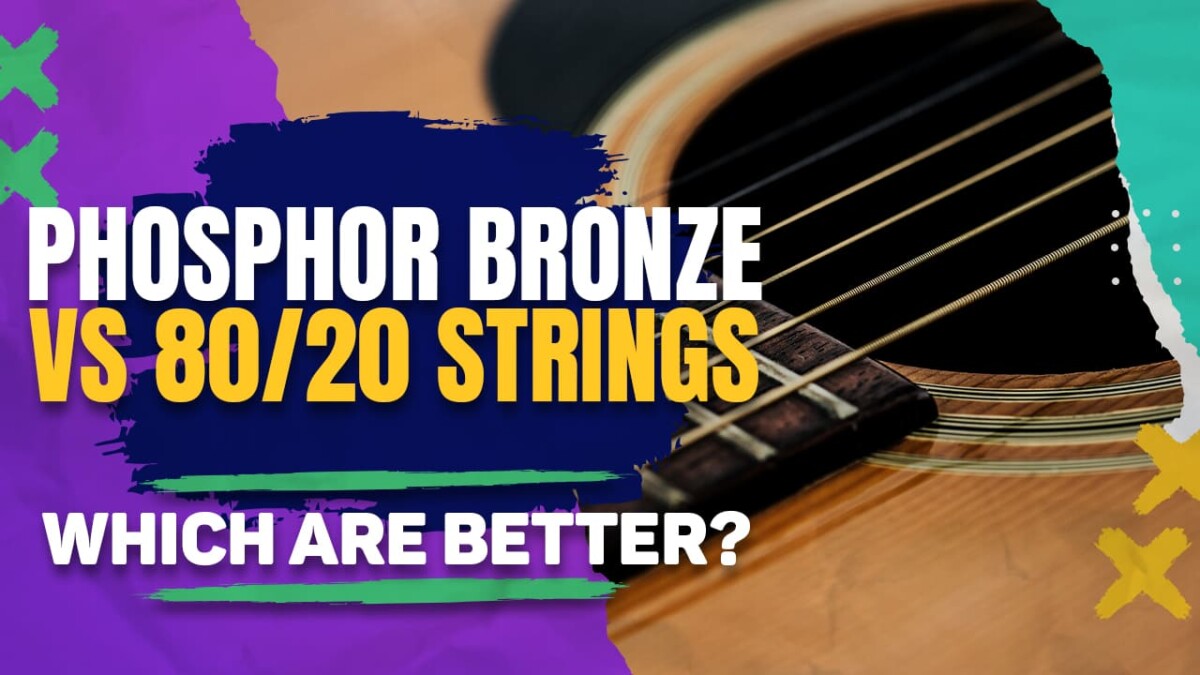Ever found yourself caught up in the mystery of phosphor bronze and 80/20 guitar strings? Let’s unravel this enigma together. These two bad boys are commonly strummed on our beloved six strings, but each rocks a unique sound and feel, boasting their own set of perks and downfalls.
We’re going to dissect what makes each string type tick and we’ll pit their sounds head-to-head, delve into where they shine best, and weigh out their pros against the cons.
Table of Contents
Characteristics of Phosphor Bronze Strings

Phosphor bronze strings for guitars have a unique, warm, and mellow aura that numerous guitar enthusiasts absolutely adore. Renowned for their smooth glide on the fretboard and outstanding tuning stability, these gems produce an incredible resonating sound that never overshadows other band instruments.
If you’re the type of guitarist who is all about maintaining an even and balanced output from your six-string instrument, phosphor bronze strings are ideal for you. Their true potential shines when played finger-style due to their flexibility and keen responsiveness to soft touches. Whether you’re ripping through some soulful blues or jazz tunes, or cranking up the power in your performance, these guitar strings never fail to hit the mark with full force.
Their durability outshines other variants; they are less prone to rusting quickly. This makes them a top-notch choice if you intend on making music with them for an extended period of time. Well, then how long do guitar strings last? It’s important to know how to clean guitar strings, since maintenance is a key aspect of prolonging the guitar strings life.
Not only do they generate high-quality sound, but also offer ease of hand exertion compared to 80/20 ones- it’s like having your cake and eating it too! These strings take care of both – your hands and ears!
Characteristics of 80/20 Strings

80/20 guitar strings, forged from a perfect mix of 80 percent copper and 20 percent zinc, unleash an electrifyingly clear tone that’s no less than pure magic. Whether you’re jamming on your electric or strumming away on your acoustic, these strings are the real deal. They’ve won over musicians around the globe thanks to their amazing durability and unrivaled sound clarity.
Here are four killer features that make these 80/20 strings totally worth checking out:
- Vivid tonality: Thanks to their distinctive mix of metals, 80/20 strings pack an audio punch brighter than most other varieties.
- Extended lifespan: Built tough with durability in mind; expect your set of 80/20s to outlive many other string sets on the market.
- Adaptable: Whether you’re shredding riffs on an electric axe or fingerpicking sweet melodies on an acoustic beauty – rest assured knowing that these versatile cords are up for it all!
- Smooth handling: The superior playability offered by these strings is hard-to-beat – making them highly sought after amongst seasoned players as well as newbies finding their groove.
In conclusion, if you desire vibrant tones matched with extraordinary endurance & flexibility while playing – look no further! Your search ends at the phenomenal invention called ‘the’ 80/20 guitar string. Perfectly suitable for both types (electric/acoustic) guitars alike!
Sound Comparison
When you pit 80/20 strings against other types, it’s hard not to notice their superior sound. They’ve got this bright, clear vibe that really pops – perfect for both electric and acoustic guitars. These strings give your music a unique sharpness and intensity.
Unlike some of the others on the market, these bad boys are excellent at fending off annoying fret buzz. This gives your playing a smoother and more consistent quality that guarantees to turn heads every time you strum those chords.
On top of all this goodness is the string tone itself: brighter than phosphor bronze strings! If lively tunes are what get you going then look no further because these guys have got your back.
Whether you’re laying down tracks in the studio or rocking out live on stage, 80/20 strings deliver an impressively warm yet rich resonance guaranteed to leave listeners wanting more.
Applications
80/20 strings are a perfect choice for both your electric and acoustic guitars, delivering a rich, hearty sound that really sets them apart. On the other hand, phosphor bronze strings have this bright tone which makes them an awesome pick for acoustic guitars.
What rocks about 80/20 strings? Well first off, they’re super economical – way cheaper than those phosphor bronze guys. Plus their tuning stability is top-notch! They can hold their tune much longer than phosphor bronze ones do. When you’re choosing between the two remember- cost-effectiveness and long-lasting tuning are key factors to weigh up.
Now let’s look at some additional aspects:
- Durability
- Tone
- Feel
- Playability
No matter which option you choose, you can be sure to get the sound you’re looking for.
Pros and Cons
Choosing between 80/20 and phosphor bronze strings? Let’s break it down.
First off, if you’re all about durability, 80/20 strings are your best bet. They’re the popular choice for players seeking a set of strings that’ll stand up to heavy use over time. But here’s the catch – they might not deliver as much sound or tone compared to their phosphor bronze counterparts.
Now let’s chat about phosphor bronze strings. These babies give out a warm, smooth tone without emptying your wallet – pretty cost-effective right? The downside though is they don’t match up in terms of longevity against 80/20s and may call for more frequent replacements.
At the end of the day, what matters most is what YOU prefer; it depends on how you want your music to sound and where you’re going to play those tunes with these strings. Take into account factors such as budget constraints, and playing style preferences alongside desired tonal output before sealing any deal.
Frequently Asked Questions
How Long Do Phosphor Bronze and 80/20 Strings Typically Last?
The durability of your guitar strings can vary massively. It all boils down to factors like string gauge, tone quality, and how frequently you jam out on your guitar. Your strings could last just a few weeks or they might even go strong for several months! So keep strumming away!
Are Phosphor Bronze and 80/20 Strings Suitable for All Types of Guitars?
Absolutely! Regardless of what type of axe you’re wielding, there are suitable strings available for it. When choosing your set, pay close attention to aspects such as tone quality and string gauge. For instance, an acoustic guitar would benefit from the warm resonance offered by 80/20 strings while phosphor bronze ones will give electric guitars that vibrant crisp sound we all love so much! Either way – both types deliver an amazing playing experience.
How Much Do Phosphor Bronze and 80/20 Strings Cost?
Prices fluctuate depending on things like tension levels and the thickness (gauge) of the wire used in construction. As a rule though – expect phosphor bronze sets to be slightly pricier than their counterparts made from an alloy known as “the good old” eighty-twenty blend.
Is It Easy to Install Phosphor Bronze and 80/20 Strings?
Trust me when I say putting new wires is almost as fun as playing them! Any pros here? absolutely, You get fresh sound. Cons? Zero! Whether it is gold-colored phosphor bronzes or shiny silver-looking eighties/twenties, The installation process remains the same super easy peasy stuff. Both types offer exact same feel and tonal quality. So go on, step up your game!
Are Phosphor Bronze and 80/20 Strings Easy to Play?
Both types are pretty smooth to play with, it just depends on what suits your style best. Typically, phosphor bronze strings offer lesser tension making them a bit more flexible whereas the good old 80/20s come with higher tension providing that firm grip while you’re jamming out those solos!
Conclusion
Regardless if you’re jamming on your guitar, strumming a banjo, or nailing notes on a mandolin, the key is to find that perfect string that resonates with your unique style.
Phosphor bronze strings dish out a mellow and full-bodied sound while their counterparts – the 80/20 strings produce an edgier, more vibrant resonance.
Each type of string comes with its own set of advantages and drawbacks. So ultimately, the ball’s in your court to determine which one will help ignite your musical prowess like stars illuminating the night sky.

